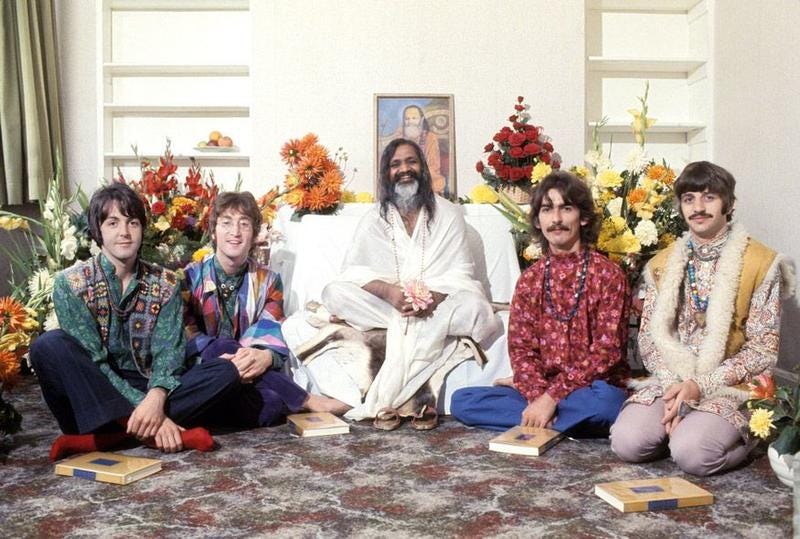The Practice That Will Boost Your 2025
Make this your new year resolution!
I’ve been busy these last couple of weeks. Life has a way of throwing challenges when you least expect them, and I decided to take some time off writing to manage everything properly.
My second son was born the day after Thanksgiving, and life with two little ones has been both joyful and chaotic. Managing the household has been a rollercoaster, and I’ve learned not to beat myself up for not writing as often as I’d planned. These first months are a whirlwind, and that’s okay. I’ve embraced the chaos, taking notes when I can and mulling over topics I want to explore in future writings.
I would like to start the year by sharing something that has profoundly helped me during overwhelming times: meditation. It’s a practice I’ve leaned on often, and I want to give you a glimpse into how it has lifted the mental weight off my shoulders, as well as some tips to help you start—or deepen—your meditation journey.
First Impressions Matter
College was a whirlwind of excitement and stress. I made lifelong friends, learned how to fend for myself, and faced the immense pressure of exams and deadlines. The stress was relentless, often leaving me physically and mentally drained.
During this time, I stumbled upon a story about the Beatles and their meditation training with Maharishi Mahesh Yogi. Being a lifelong Beatles fan, I was intrigued. Meditation seemed like a way to silence the constant chatter in my mind and find a semblance of peace. At least, that’s what I thought at the time.

My initial attempts at meditation were frustrating. I believed it was about “not thinking,” and when I couldn’t shut my brain off, I decided it wasn’t for me. For years, I dismissed meditation as ineffective.
But life has a way of circling back. When I moved to the United States, a new wave of challenges and anxieties arose. I picked up The Urban Monk (paid link) by Pedram Shojai, which introduced me to different approaches to meditation: breathing exercises, mindfulness practices, visualization, and energy work. These techniques helped me become more present, but I still struggled with the constant stream of overwhelming thoughts.
Therapy: The Missing Piece
Everything changed when I started therapy. Through techniques like Cognitive Behavioral Therapy (CBT), I learned to observe my thoughts without judgment. My therapist taught me to let my thoughts flow, acknowledging them as fleeting rather than permanent. This practice aligned closely with cognitive defusion, a concept in Acceptance and Commitment Therapy (a CBT variant).
For the first time, I felt like I had control over my mind. Instead of being swept away by my thoughts, I could let them pass like leaves floating down a stream. It wasn’t about stopping my thoughts—it was about changing my relationship with them.
How I Manage Overwhelm Today
Now, I can recognize when I need to meditate. Over time, I’ve become attuned to the triggers that make my mind spiral—when my thoughts pile up faster than I can process them. It’s at these moments that I turn to my go-to practices:
Sitting Meditation: The classic approach. I sit down, breathe deeply, and let my thoughts come and go without attachment.
Walking My Dog: This gives my mind permission to wander freely while I remain present with my surroundings.
Gardening: This meditative practice has become almost automatic, allowing my brain to rest while my hands work.
Cooking Familiar Recipes: There are dishes that I know from memory — like Risotto al Pesto — that after awhile becomes easy to prepare. This provides a calming rhythm that helps me unwind.
These practices create space for my mind to breathe, but they aren’t enough on their own. Writing has become my second brain—a place to offload lingering thoughts. Whether on paper or a digital note, writing helps me declutter my mind and focus on what truly matters.
My next goal
This journey has been one of trial and error, but therapy was the catalyst for meaningful change. Meditation alone didn’t solve everything—it was the combination of mindfulness, self-reflection, and writing that made the difference.
If you’re considering starting your own meditation practice, here’s what I recommend:
Get to Know Yourself: Therapy can provide valuable insights.
Educate Yourself: Read about different meditation practices and experiment with them.
Stay Consistent: Discipline is your ally.
Be Patient: Don’t beat yourself up if progress feels slow.
Reflect: Journaling can help you track your growth.
Takeaways
Meditation isn’t about shutting off your thoughts—it’s about changing how you interact with them. It’s a tool to bring you back to the present moment, allowing your thoughts to flow without overwhelming you.
Explore different meditation techniques to find what works best for you. Pair it with writing to offload mental clutter and create space for growth. Over time, you’ll find that these practices not only lift the weight off your mind but also help you approach life with greater clarity and intention.
What helps you slow down and find balance? I’d love to hear your thoughts.
Have a wonderful week and an excellent 2025!
Affiliate Disclosure
At Self-Disciplined, we believe in transparency and honesty. Some of the links on this website are affiliate links, meaning that if you click on one of them and make a purchase, I may earn a small commission at no extra cost to you. These commissions help support the work put into this site and keep it running. Rest assured, I only recommend products or services that I genuinely believe in and that I think would bring value to my readers.
Thank you for your support!



